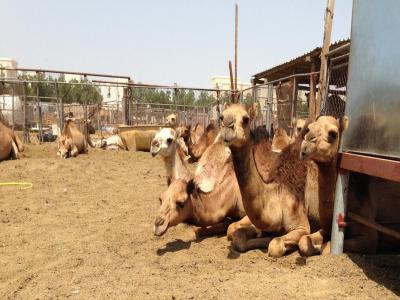 Middle East respiratory syndrome coronavirus (MERS-CoV) is a virus transferred to humans from infected dromedary camels. It has been identified in several countries in the Middle East, Africa and South Asia. The disease is contractable through direct or indirect contact with infected animals. Human-to-human transmission is possible, but only a few such transmissions have been found among family members living in the same household. Human-to-human transmission appears to be more frequent in health care settings. Infections range from asymptomatic or mild respiratory symptoms to severe acute respiratory disease and death.
Middle East respiratory syndrome coronavirus (MERS-CoV) is a virus transferred to humans from infected dromedary camels. It has been identified in several countries in the Middle East, Africa and South Asia. The disease is contractable through direct or indirect contact with infected animals. Human-to-human transmission is possible, but only a few such transmissions have been found among family members living in the same household. Human-to-human transmission appears to be more frequent in health care settings. Infections range from asymptomatic or mild respiratory symptoms to severe acute respiratory disease and death.
No vaccine or specific treatment is currently available. Treatment is supportive and based on the patient’s clinical condition. As a general precaution, anyone visiting farms, markets, barns, or other places where dromedary camels and other animals are present should practice general hygiene measures, including regular hand washing before and after touching animals and avoiding contact with sick animals. The virus appears to cause more severe disease in older people, people with weakened immune systems and those with chronic diseases such as renal disease, cancer, chronic lung disease, and diabetes. These people should avoid contact with camels, drinking raw camel milk or camel urine, or eating meat that has not been properly cooked.
WHO's MERS-CoV page: https://www.who.int/health-topics/middle-east-respiratory-syndrome-coronavirus-mers#tab=tab_1
United Nations Medical Directors Risk Mitigation Plan for Middle East respiratory syndrome coronavirus (MERS-CoV): Recommendations for UN Personnel
